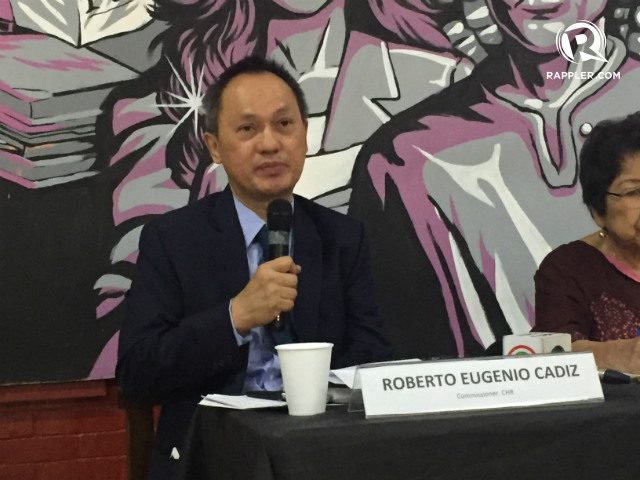SUMMARY
This is AI generated summarization, which may have errors. For context, always refer to the full article.

MANILA, Philippines – An official from the Commission on Human Rights (CHR) urged the Philippine government to just squarely face the International Criminal Court (ICC) instead of withdrawing from it.
CHR Commissioner Roberto Cadiz on Thursday, March 15, said the administration of President Rodrigo Duterte cannot just sweep the issue under the rug or resort to propaganda.
“Walang takutan dito kasi, unang-una, hindi naman matatakot ang ICC sa atin (There’s no scary tactics here because, first of all, the ICC won’t be scared of us),” he said. “Whether we like it or not, this will proceed and the only smart thing is for the government now is to heed the warning of the court.”
“The ICC guys are professionals, they have solid reputations, and they cannot be intimidated,” he added.
Duterte on Wednesday, March 14, declared that the withdrawal would take effect immediately despite the Rome Statute explicitly saying that it will take effect only one year after the submission of a letter. (READ: What the Rome Statute says about withdrawing from the Int’l Criminal Court)
Calling the signing of the statute fraudulent, Duterte said the Philippines was “made to believe that the principle of complementarity shall be observed, that the principle of due process and the presumption of innocence as mandated by our Constitution and the Rome Statue shall prevail, and that the legal requirement of publication to make the Rome Statute enforceable shall be maintained.”
Cadiz urged the administration to stop coming up with “puny rationalizations” to defend its withdrawal as a member-state. Duterte, in his 15-page statement on Wednesday, said that the non-publication of the Rome Statute in the Official Gazette makes the ratification “fraudulent.”
“Itigil na ang kalokohan na ito (Stop this madness),” he said. “In the first place, the President himself already recognized earlier the jurisdiction of the ICC and, in fact, he said that he was going to defend himself before the ICC.”
The decision comes over a month after the ICC’s Office of the Prosecutor announced it is starting a preliminary examination “following a careful, independent, and impartial review of communications and reports documenting alleged crimes” committed in the Philippines since 2016. (READ: Int’l Criminal Court takes 1st step in probe into Duterte drug war)
Malacañang initially said Duterte welcomed the court’s examination of the drug war, but has since changed its tune.
“The President welcomes the preliminary examination because he is sick and tired of being accused of the commission of crimes against humanity,” Presidential Spokesperson Harry Roque said in early February. – Rappler.com
READ Rappler’s explainers:
Yes, Int’l Criminal Court can prosecute Duterte for killing spree
Police, military officials liable for Duterte’s illegal kill orders
What challenges will complaint vs Duterte face before ICC?
ICC’s track record and what it means for Duterte and the PH
Add a comment
How does this make you feel?
There are no comments yet. Add your comment to start the conversation.